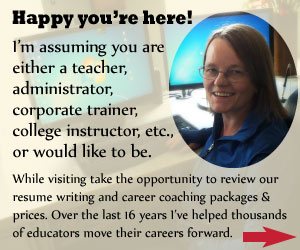The Importance of Researching a School District to Respond to Interview Questions
Now that you have secured a job interview for that dream teaching job, what's next? Researching the school district and learning what you can before going to the interview would be a priority.
Here is an interview preparation scenario. You have picked out the appropriate attire and rehearsed answers to the interview questions you are anticipating in front of the mirror.
Do you feel ready to face the school administrator or the interview panel or committee?
Wait! Are you fully ready?
Have you researched the school district and studied their educational mandate or district-wide goals and objectives?
Many teachers will sit in the interview hot seat before the same hiring board answering the same questions. One of those teachers will make a more meaningful connection with the hiring board. By being responsive to the needs of the school district, that special teacher job candidate could be you.
Before embarking on that teaching interview, a proactive job candidate will take the time to research the school district.
Being equipped with the appropriate information can provide you with an edge over your job search competition and allow you to take control of the interview. By obtaining additional knowledge about the school district and its goals, you will be more prepared. This preparation will give you the confidence to answer interview questions about the school community or district during the interview.

Keep in mind; it is not unusual to be asked by the interviewer to describe what you know about the school district or why you want to work in that school district. The knowledge you gained from researching the school district will help you create and ask relevant questions when provided with the opportunity to do so.
Imagine that you are the hiring authority:
Wouldn't you find it frustrating to interview a potential educator who knows nothing about the school, its district, or its future goals?
Adequately researching a school district will help you determine whether your career targets and objectives fit within the directive of that district. Below are three questions that a professional educator should be able to answer before going to the interview:
Why do you want to work for our school district?
What do you know about our school district?
Do you have any questions for us?
Knowing the school district and the potential employer is as important as knowing exactly how you are going to answer specific questions.
5 Areas to Focus on When Researching a School District
By researching these five main areas of top-of-mind concern to your school district and the quality of education they deliver, you will be able to communicate how you can contribute to their specific education mandate.
1. Education Philosophy and Mission Statement
Upon quick review, many of the education philosophy statements may seem to read the same. More emphasis is being placed on education philosophies and an increase in thought and effort goes into developing them.
Key sections of a school district's philosophy you may want to familiarize with include their approach towards:
- Teaching approach and methods
- Discipline and behavioral management
- Classroom management
- Curriculum development
- Administration and leadership
If you can speak to how you would contribute to meeting their objectives in each one of these areas, you will make a positive impression. The statement should be posted on the website, making it easy to review the school's educational philosophy and understand its key objectives.
2. Teaching Methods
Over many years of dedicated teaching, each school district has discovered which teaching methods best advance the education goals of its student profile. By knowing which programs the school district uses, you can speak to your qualifications and experience using them.
If you have no experience in one teaching area, consider enrolling in a program to improve in this field before the interview. Let's say you are a new teacher still perfecting developing differentiated learning lessons. When the school district asks about your skills in this area, rather than respond with a negative, you can tell them about your initiatives to pursue professional development to learn new teaching methods or the book you just completed on the topic.
3. Teaching Programs and Tools
Similarly, you will want to demonstrate your experience using their preferred teaching programs and tools. You may want to speak with teachers in the district to gather more information about their day-to-day teaching activities.
They may have long ago replaced Hooked on Phonics with a new program with an app so students can practice anytime, anywhere. You will not appear current if you are not up on these new app-based programs. Moreover, you may put the hiring board to sleep if your frame of reference is 10-year-old programs.
A teacher who is up to date on the latest tech tools used in education can not only match her skills with those desired by the school district but also may share new techniques and knowledge.
4. Behavioral Management
Researching a school districts' behavioral management approach provides an opportunity to demonstrate well-developed skills and knowledge in classroom discipline. An unprepared candidate is more likely to list off behavioral management techniques in isolation. A prepared candidate will integrate behavioral management into her teaching approach. You want to show that you are proactive and positively changing students' behavior through a holistic approach to education, not a reactive one.
5. Teacher and Student Profile
Here is an interviewing example where the teaching candidate did not research the school district. The interview panel was highly impressed with the teaching qualifications of one of the special education specialist interviewed. The trouble was, the position was for a school running inclusive classrooms and respected for its impressive student achievement record.
Even when probed during the interview through questions, not one example of inclusive education was offered by the teacher. Unfortunately, she did not research the school district in advance. She knew absolutely nothing about the teaching approach that the school supported day in and day out.
The job candidate who understands the student profile and has experience improving the learning outcomes of these students would get a second look. Researching the teacher profile is another way of learning the necessary teaching expertise to match the position.
Strong evidence of your ability to work with a particular student population is the capacity to engage the students. Be prepared for interview questions centered on student engagement. Prepare your real-life classroom examples, even if not asked directly.
Keep in mind that the purpose of an interview is to create a positive impression, highlight your talents and skills, and showcase your knowledge. It is also a time to exhibit your objectives, highlighting how your interests, goals, and personality will fit into the district's mandate.
Your interview is your only chance to provide a first-time positive impression; therefore, taking the additional time and effort to do a little homework by researching the school district is a worthwhile investment to increase your chances of securing that coveted teaching position.
We have touched on some of the main areas, but there are many more tips on how to research the school district to land a job offer. Play the matchmaker game. Match your primary teaching responsibilities with the needs of the school district. Do you know how the school district assesses performance?
Knowing the interview questions and their potential answers can be helpful. We have created two eBooks to do just that, the first is A+ Teachers' Interview Edge and the second is A+ Principals' Interview Edge.
Need some writing help making a stellar teacher resume, cover letter, or CV curriculum vitae? Take the time to review and order one of our resume packages or individual services.
Learn more about Candace Alstad-Davies by reviewing this about me page. From that page, you can review testimonials and frequently asked questions.
Have questions, please connect by sending an email to Candace or call toll-free at 1 877 738-8052. I would enjoy chatting with you.

